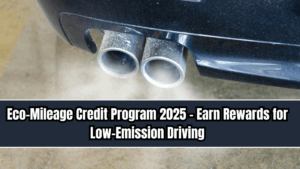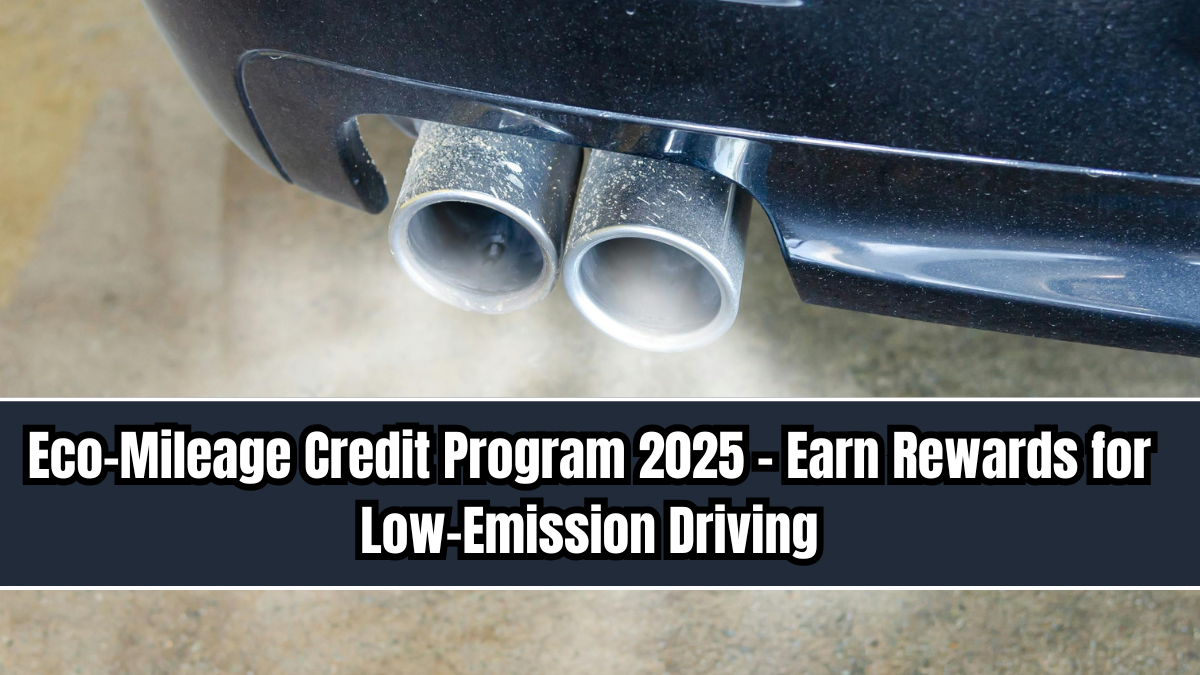In 2025, India is taking a major step toward sustainable transport with the introduction of the Eco-Mileage Credit Program. This groundbreaking scheme rewards drivers who keep their vehicles fuel-efficient and low-emission, encouraging eco-conscious driving across the country.
The program is not just about reducing pollution—it’s about creating a culture of responsible driving, where motorists are incentivized to maintain their vehicles, adopt greener habits, and contribute to India’s climate goals.

What Is the Eco-Mileage Program?
The Eco-Mileage Program 2025 is a government initiative that assigns eco-credits to drivers based on their vehicle’s mileage, fuel efficiency, and emission levels. These credits can later be redeemed for:
-
Fuel discounts at authorized petrol and diesel stations.
-
Toll fee reductions on national highways.
-
Insurance premium rebates for eco-conscious drivers.
-
Shopping and service vouchers linked with partner companies.
The goal is simple—reward those who drive responsibly and penalize vehicles that harm the environment with higher emissions.
How It Works
The program is powered by smart tracking systems and vehicle emission tests:
-
Vehicle Monitoring – Cars and two-wheelers are fitted with digital meters or linked through existing OBD (On-Board Diagnostics) systems.
-
Mileage & Emissions Tracking – Data on mileage and emissions is collected during fitness tests, service checks, and road monitoring.
-
Credit Allocation – Based on performance, drivers earn monthly eco-credits.
-
Redeeming Credits – Points are redeemed through government and private partner platforms.
For example, a driver maintaining 20 km/l mileage with low CO₂ output may earn fuel credits worth ₹500–₹1000 monthly.
Why It Matters
India is home to over 300 million registered vehicles, making transport a major contributor to urban air pollution. With rising fuel costs and environmental concerns, the Eco-Mileage Program 2025 offers a dual advantage:
-
For drivers: Reduced expenses through rewards and savings.
-
For the environment: Lower emissions and improved urban air quality.
This program ties directly into India’s commitment to achieve Net Zero emissions by 2070.
Benefits for Drivers
The Eco-Mileage Program creates a win-win scenario for motorists:
-
Lower Fuel Costs: Regular credits help offset rising fuel prices.
-
Vehicle Longevity: Encourages regular servicing and maintenance.
-
Financial Incentives: From toll fee waivers to lower insurance premiums.
-
Eco Recognition: Drivers earn digital badges for eco-friendly driving, promoting pride in sustainable habits.
These benefits are expected to appeal to both individual commuters and commercial fleet operators.
Impact on the Automobile Industry
Car manufacturers are also adjusting to the new program. Many brands are now marketing vehicles as “eco-mileage certified”, highlighting their compatibility with the program. Service centers are offering green check-ups, ensuring cars meet program requirements and maximize driver credits.
In addition, the policy is pushing automakers to innovate with hybrid engines, fuel-efficient technologies, and low-emission designs, creating a positive ripple effect across the industry.
Government and Private Partnerships
The success of the Eco-Mileage Program lies in its partnership model. Fuel companies, toll operators, insurance firms, and retail brands are collaborating to make eco-credits redeemable across multiple services.
For instance:
-
A driver might get fuel cashback at Indian Oil pumps.
-
FASTag-linked toll discounts for high eco-mileage drivers.
-
Insurance companies offering up to 15% rebates for eco-certified vehicles.
This interconnected system ensures that eco-driving habits translate directly into real-world financial rewards.
Challenges Ahead
While promising, the program faces some hurdles:
-
Data accuracy – ensuring emission readings and mileage data are tamper-proof.
-
Public awareness – educating drivers on how to qualify and maximize benefits.
-
Technology access – integrating older vehicles into the system.
To address these, the government is working on AI-powered fraud detection and providing low-cost retrofitting devices for older vehicles.
Looking Ahead
If successful, the Eco-Mileage Credit Program could expand into pan-Asian collaborations, where eco-credits are recognized across borders for international drivers. The model could also extend to electric vehicles, rewarding users for renewable-powered charging.
By 2030, India hopes to have 50% of its vehicles actively participating, creating a nationwide ecosystem of green, responsible, and incentivized driving.
Final Thoughts
The Eco-Mileage Credit Program 2025 is more than a policy—it’s a cultural shift in how India views driving. By rewarding fuel efficiency and penalizing pollution, the program turns everyday commutes into opportunities for eco-conscious contribution.
For drivers, it means savings and recognition. For automakers, it sparks innovation. And for India, it ensures that every kilometer driven is a step closer to a cleaner, greener future.
FAQs
What is the Eco-Mileage Credit Program 2025?
It is a government scheme that rewards drivers for maintaining fuel-efficient and low-emission vehicles with redeemable eco-credits.
How do drivers earn credits?
Credits are based on vehicle mileage, emission levels, and regular maintenance, tracked through smart systems and emission tests.
What rewards can drivers get?
Drivers can redeem eco-credits for fuel discounts, toll fee reductions, insurance rebates, and shopping vouchers.
Who is eligible to join the program?
All private and commercial vehicle owners in India can enroll, with both two-wheelers and cars covered.
How does the program help the environment?
It reduces vehicle emissions, improves air quality, and encourages drivers to maintain fuel efficiency.
What challenges does the program face?
Data tampering, low awareness, and integration of older vehicles are current challenges being addressed with new technology.
Will the program expand in the future?
Yes, the scheme may extend to electric vehicles and even international eco-credit collaborations in coming years.
Click here to know more.
